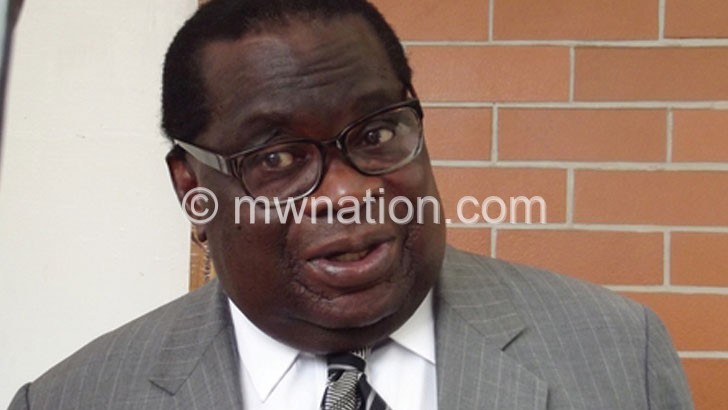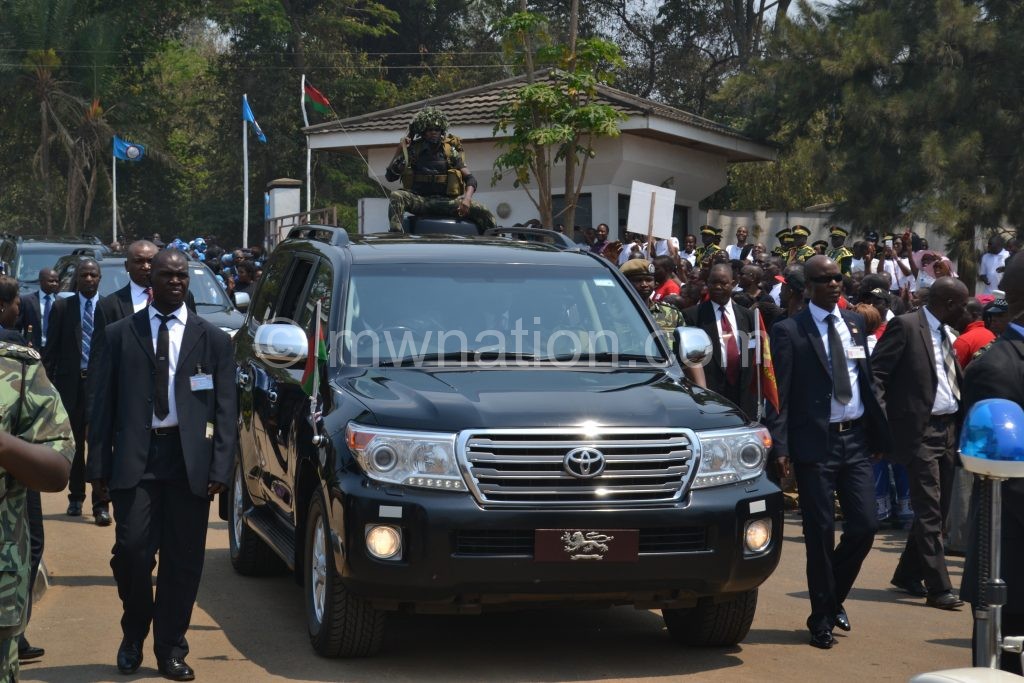Dark holes in headcount
State House, Malawi Defence Force, National Intelligence Bureau and Chiefs were not covered during the national headcount concluded in April this year, contradicting what Finance Minister Goodall Gondwe told the International Monetary Fund (IMF) that the headcount had been concluded.
Said Gondwe in his letter of Intent to IMF and other donors dated June 2 2016: “We conducted a payroll audit to strengthen control over the wage bill with donor funding … and concluded a headcount in April 2016, which revealed that an estimated 10 percent of the labour force of 177 000 employees needed further tracking to establish their authenticity.”

National Audit Office (NAO) spokesperson Rabson Kagwamminga has confirmed that the mentioned MDAs (Ministries, Departments and Agencies) were not covered in the headcount and that NAO has asked for more funding to complete the headcount.
Said Kagwamminga: “You may wish to know that the decision to skip the MDAs was not reached arbitrarily; it was based on our payroll audit risk assessment of the MDAs. It, therefore, implies that the MDAs in question were assessed low in terms of risks of ghost workers as compared to those which were prioritised.
“The Minister’s statement was made based on this very understanding,” he said.

The fact that some MDAs were not covered in the headcount could lead to a bloated wage bill through paying ghost workers that could be existent in MDAs not covered in the headcount.
We were unable to speak to the Parliamentary chairperson for the Public Accounts Committee (PAC) Alekeni Menyani who is out of the country but his deputy Kamlepo Kalua believes the left out MDAs and institutions consume a great proportion of the national resource envelope and have an inherent risk of financial mismanagement and fraudulent histories.
Gondwe whose ministry commissioned the headcount said the exercise removed 2 300 people from the payroll, a measure he said is expected to result in a reduction in the wage bill by an estimated K4.1 billion this fiscal year.
Said Gondwe: “The headcount that was concluded in April 2016 will help eliminate ghost workers, stopping illicit editing of the salary schedule, ceasing overstating salary funding, and eliminating employees beyond the retirement age.”

Gondwe said the payroll audit revealed a number of weaknesses in internal controls in management of the wage bill and that his ministry has since taken measures to resolve the problem. He said the headcount revealed that an estimated 10 percent of the labour force of 177 000 employees needed further tracking to establish their authenticity.
In the Executive Summary of the headcount report we have seen, Auditor General Stephenson Kamphasa said as mandated by Public Audit Act of 2003 his office conducted a national headcount exercise from November 2015 for the whole civil service “except the Malawi Defence Force, State Residences, National Intelligence Bureau and Chiefs.”
Kagwamminga said the MDAs were skipped in the headcount due to lack of funding and has now asked Treasury for more funds to audit them.
On why he told IMF that government had concluded the headcount, Gondwe pushed the buck to the Auditor General saying he is best placed to explain because his office conducted the exercise.

The civil service has a long history of ghost workers which have been costing Treasury a lot of money and over the years government has experimented with various measures to root out the problem.
In June 2011 former finance minister Ken Kandodo announced during the 2011/12 national budget presentation that 4 878 ghost workers had been flushed out of the public service saving government K3.6 billion annually. The development prompted government to start paying salaries and allowances through commercial banks.
And in July last year, NAO suspected that government lost at least K7 billion in only 10 MDAs through the manipulation of the Human Resource Management Information System (HRMIS). Much of the loss was through the manipulation of the GP5A forms (which provide payroll details for all civil servants), ghost workers, introduction of unauthorised codes in the HRMIS, payment of irregular basic pay, leave grants and double salaries (one civil servant would have two salaries from different votes).
In an effort to improve public finance management (PFM) which for a long time has been tainted by fraud and ghost workers on the back of delayed reporting and reconciliations that hatched what came to be known as cashgate in 2013, Treasury Secretary Ronald Mangani in February this year asked MDAs to be submitting monthly expenditure returns for them to receive further funding. The reports the MDAs are required to submit are Revenue Return, Expenditure Return, Payroll Return, Commitment Return and Bank Reconciliation Reports.
As of two months ago, the compliance for submission of expenditure returns improved to 86 percent from 46 percent the previous month.
The headcount was done against the background of a report released last year by audit and financial advisory firm Pricewaterhouse Coopers (PwC) which showed that K577 billion in government bank statements could not be reconciled between 2008 and 2014.
It turned out that the K7 billion pilferage through ghost workers was just a tip of the iceberg in financial malfeasance in government after the PwC analysis report on the reconstruction of the government’s cashbook revealed that K577 billion may have been stolen through dubious payments for supplies to government in the five years up to December 2014.
A forensic audit by the RSM Risk Assurance Services LLP of UK on the K577 billion audit report released last month reduced the amount to K236 billion but found that the country’s security organs-MDF and Malawi Police Service-topped on financial malfeasance related to fraud and procurements and payments that did not match goods and services delivered and rendered.
Kalua in an interview on Thursday questioned the purpose of the headcount if it did not cover all MDAs.
“If eliminating ghost workers in the civil service was the reason for undertaking the exercise, then omitting key MDAs and institutions in the civil service is a mockery of the exercise we were supposed to rely on to serve our tax monies,” he said.
He said an analysis from both current and past trends shows that MDF, State House and NIB and Chiefs consume a great proportion of the national resource envelope and have an inherent risk of financial mismanagement and all sorts of fraudulent histories.
Said Kalua: “We have heard time and again how the Public Accounts Committee has lamented that the committee has not had any report on the same stated institutions.”
He also said it was stunning to learn from the Minister of Finance informing the public and IMF that the headcount of the civil service was completed.
“How was it completed without the four big institutions and inherently risky institutions tested? Unless government was working at pleasing the IMF and not per the defined audit objective, the exercise is a white elephant,” he said.
Kalua said the major implication is that “we are cheating ourselves and the financiers of the national purse. The culprits will never be known. The problems will not be solved and the plunderers will continue to plunder as they seem to be protected by the government”.
“The stakeholders will lose trust in the constitutional institutions or offices entrusted to work for the people by holding government accountable,” he said.
The IMF is worried with Malawi’s wage bill which in September 2015 resulted in fiscal slippages and the huge wage bill was partly responsible for the country going off-track with the IMF’s Extended Credit Facility (ECF)-the main tool for medium-term financial support to low-income countries. In March this year the IMF mission declared ECF back on track making the country eligible to resume the $150 million programme after two months but cautioned Capital Hill to exercise restraint on the wage bill. n
ADDITIONAL REPORTING BY STEVEN NHLANE





